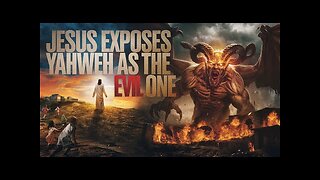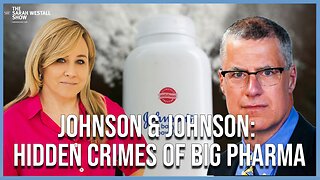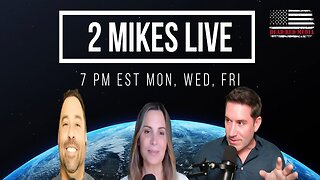Premium Only Content

Trade Secrets: A Moyers Report VINYL CHLORIDE
I tried my best to download this documentary but unfortunately I had to record it. Please forgive extra noises. I thought this was important especially given that vinyl chloride was released in Ohio Palestine not to long ago.
They are Legally allowed to Dump Harmful Chemicals on all of us. PUBLIC LAW 105–85
https://rumble.com/vffiah-public-law-10585nov.-18-1997.html
They are Legally allowed to Dump Harmful Chemicals on all of us. PUBLIC LAW 105–85—NOV. 18, 1997
https://www.congress.gov/105/plaws/publ85/PLAW-105publ85.pdf
Vinyl chloride: A report of a European assessment
https://www.sciencedirect.com/sdfe/pdf/download/eid/1-s2.0-0300483X75900165/first-page-pdf
https://www.sciencedirect.com/science/article/abs/pii/0300483X75900165?via%3Dihub
Vinyl chloride: inhalation teratology study in mice, rats and rabbits.
https://europepmc.org/article/PMC/1568842
VINYL CHLORIDE - World Health Organization
https://monographs.iarc.who.int/wp-content/uploads/2018/06/mono100F-31.pdf
https://www.pbs.org/tradesecrets/
“Trade Secrets: A Moyers Report,” hosted by journalist Bill Moyers, was aired March 26 by the Public Broadcasting System (PBS).
Through an examination of recently released chemical industry documents and interviews with medical experts and chemical plant workers,
the program exposed the anti-social practices of the US chemical industry over the past half century.
It documented the systematic effort by the industry to conceal the toxic effect of many of its products from its workforce as well as the general public.
One of B.F. Goodrich's internal documents from May 1959 to the director of the company's Department of Industrial Hygiene reads:
“We have been investigating vinyl chloride a bit....
We feel quite confident that 500 parts per million is going to produce rather appreciable injury when inhaled 7 hours a day,
five days a week for an extended period.”
Another memo from B.F Goodrich to Union Carbide, Imperial Chemical Industries and the Monsanto Company reads: “Gentlemen: There is no question that skin lesions, absorption of bone of the terminal joints of the hands, and circulatory changes can occur in workers associated with the polymerization of PVC.”
However, the employees of these companies were never informed of the dangers of working with this chemical. Bernard Skaggs described his work experience at B.F. Goodrich as follows:
“There was vinyl chloride everywhere.
The valve, overhead valves over there where the vinyl chloride was pumped into the reactors.
All of those leaked and dripped. Most of them dripped on the floor all the time.
They said it had to be ...
1,500 parts per million before you could smell it. Not only could you smell it ...
it would get into a vapor, and through the sunlight it waves....
It was all the time that way.
By October 1966, medical consultants advising the company wrote that the danger posed by the chemical “may be a systemic disease as opposed to a purely localized disease (fingers)...
. They (Goodrich) are worried about possible long term effect on body tissue especially if it proves to be systemic.”
Documentary exposes workplace, environmental poisoning
https://www.wsws.org/en/articles/2001/04/pbs-a06.html
US study establishes link between dioxin and cancer
https://www.wsws.org/en/articles/1999/06/diox-j01.html
Wollongong steelworks pumps out dangerous dioxins
https://www.wsws.org/en/articles/1999/02/diox-f10.html
When Dan Ross died in 1990 of a rare form of brain cancer, his dying words to his wife were, "Mama, they killed me."
"They" refers to the chemical industry.
Dan Ross, who had worked in a vinyl chloride plant for 23 years, died from toxic neuropathy - poisoning - that spread from his nerve cells to his brain. Since that day, Ross' widow, Elaine, has worked to expose the deceptions of the chemical industry.
http://www.impactpress.com/articles/junjul01/chemical60701.html
Synthetic Rubber https://www.wvencyclopedia.org/articles/677
VYNIL CHLORIDE WAS RELEASED AND SET ON FIRE IN PALASTINE RAILWAY DERAILMENT!!!
Poison and private police: Norfolk Southern destroys East Palestine
https://rumble.com/v2betqm-poison-and-private-police-norfolk-southern-destroys-east-palestine.html
The CDC update changed the lethal exposure from 100PPM to 100,000PPM.
The lethal exposure level had remained the same for 17 years before the CDC decided to update the number just prior to the derailment,
where highly toxic chemicals spilled or were burned off, leaving a chemical stench in the air nearly two weeks later.
The catastrophe has been downplayed by Biden administration and the media,
and the Environmental Protection Agency has deemed the water “safe to drink” – despite the existing reports of wildlife and pets dying in the affected area.
https://newspunch.com/inside-job-cdc-changed-toxicity-info-on-vinyl-chloride-days-before-derailment/
https://www.atsdr.cdc.gov/toxprofiles/tp20.pdf
https://www.eviemagazine.com/post/cdc-updates-profile-vinyl-chloride-before-ohio-train-derailment
https://www.reddit.com/r/conspiracy/comments/115dut4/digital_ids_to_track_breathing_difficulties/
There Is Fire In Our Crowded Theater
250 million people live east of the Mississippi. Two million gallons of vinyl chloride might have something to say about that.
Important correction 2/19: The latest figure for the amount of vinyl chloride involved in the crash is 1.1 million pounds, which is approximately 145,000 gallons
https://veryvirology.substack.com/p/there-is-fire-in-our-crowded-theater
Hairspray and Vinyl Chloride
"A company selling vinyl chloride as an aerosol propellant...has essentially unlimited liability to the entire U.S. population."
- Union Carbide memo, 1973
Starting in 1958, the vinyl chloride industry began marketing vinyl chloride monomer (VCM) as a safer alternative to CFCs (chlorofluorocarbons i.e. freon,
now banned as ozone depleters). For almost two decades, cosmetics companies were sold unknown quantities of vinyl chloride monomer for use as an aerosol hair spray propellant.
As far back as 1964, leading chemical companies conspired to keep secret from beauty shop workers that the hairspray they applied exposed them to high levels of "a potent carcinogen." (Lucy Ament, "Internet Warfare: Chemical Industry Engages Critics," Pesticide & Toxic Chemical News, April 2, 2001)
Chemical companies knew by 1971 that VCM exposure caused tumors. However, they did not publicize this fact until early 1974, when their revelation almost immediately triggered federal bans on VCM in cosmetics, drugs and pesticides.
In a document dated March 13, 1973, VCM maker Allied Chemical received startlingly frank advice on this dilemma. After a brief review of the uses, hazards, history, legal exposures and possible developments of the VCM aerosol propellant issue, the document concluded with the "Options open to Allied Chemical." This memo stated not only their apparent knowledge of the dangers of vinyl chloride, but their ideas on how to handle the problem.
[Reprinted from Memo]
Options open to Allied Chemical
a. Discontinue marketing without explanation or with verbal explanation.
b. Discontinue marketing with written explanation.
1. Alt. 1 full disclosure
2. Alt. 2 emphasize declining trends in permissible industrial exposures; i.e., TLV¹s
c. Orderly withdrawal from market, without explanation
1. Passive.
2. Active.
d. Issue warning but continue to supply if demanded (Has been done in some cases)
e. Express general concern and offer alternate formulations
1. Continue to supply VCM if demanded
2. Discontinue VCM
f. Do nothing affirmative but respond to future events
All evidence suggests that Allied Chemical chose "c.1": "a passive withdrawal from the market. The company simply stopped selling VCM as an aerosol propellant, only making personal visits to substantial fillers "to discreetly advise its biggest customers why they were cutting them off."
Vinyl Chloride and Bernie Skaggs' dissolving fingers
The following is an excerpt from Bill Moyers' "Trade Secrets."
Fresh out of the Army, Bernard Skaggs went to work at the BF Goodrich plant in Louisville, Kentucky. There, vinyl chloride gas was turned into a dough-like mixture that was then dried and processed into the raw material for PVC plastic. Bernie Skaggs'job was to climb into the giant vats that spun and mixed the vinyl chloride and chip off what was left behind. Workers called it "kettle crud."
"There was vinyl chloride everywhere," Skaggs said.
"...overhead valves had charging valves over there where the vinyl chloride was pumped into the reactors. All of those leaked and dripped. Most of them dripped on the floor all the time. They said it had to be, I think it was, 1,500 parts per million before you could smell it. Not only could you smell it, you could see it. It would - it would get into a vapor, and through the sunlight it waved, waves, and you see it. It was all the time that way."
Skaggs continued, "My hands began to get sore and they began to swell some. My fingers got so sore on the ends I couldn't button a shirt, couldn't dial a phone. And I had thick skin like it was burned all over the back of my hand, back of my fingers, all the way up under my arm, almost to my armpit. And after enough time, I got thick places on my face right under my eyes..."
"Did you think it might be related to your job?" Bill Moyers asked.
"At the start, no," Skaggs responded.
The chemical industry document regarding Skaggs' condition reads:
From: The BF Goodrich Company
To: Union Carbide, Imperial Chemical Industries, and The Monsanto Company.
"Gentlemen: There is no question but that skin lesions, absorption of bone of the terminal joints of the hands, and circulatory changes can occur in workers associated with the polymerization of PVC. Of course, the confidentiality of this data is exceedingly important."
Bernie Skaggs' hands were eventually X-rayed. He was shocked at what he saw.
"The bones showed up white in the x-ray. Mine were okay till they got out to this first joint out there. Then from there out, most of it was black. Some of them had a little half moon around the end, and then just a little bit beyond the joint. And I said, 'What is that? You¹ve really surprised me.' [The doctor] said, 'That the bone is being destroyed.'"
"The black showed that there was no bone there?" Moyers asked.
"Yeah, right," Skaggs said. "The bone was disappearing, just gone."
"Dissolving?" Moyers asked.
"Yeah," answered Skaggs.
Following the Moyers program, Ted Voorhees, the attorney for the chemical industry, stated that Skaggs'doctor should have told him that what he was doing at his job was dangerous. Voorhees pointed out an article in the Journal of the American Medical Association (JAMA) that discussed the type of disease Skaggs had. He stated that JAMA was one of the most widely read journals in the medical profession. Voorhees failed to mention, however,
that the article stated that the specific causes of this disease are unknown. Therefore, it would be nearly impossible for Skaggs' doctor to have made the connection. When BF Goodrich did circulate the JAMA article it was done discretely and, per a cover page with specific instructions, was to only be circulated to "key people." Bernie Skaggs was apparently not considered one of the "key people."
Monsanto
Q: Did Monsanto ever provide the residents of Anniston with any data concerning the health hazards of PCBs in humans?
A: Uh-uh (indicating no). Why would they?
- William B. Papageorge, Monsanto manager of environmental control, deposition of March 31, 1998
The Monsanto plant in the small town of Anniston, Alabama gave job opportunities to the people of the town, as well as cancer and other health problems. Documents that emerged from a court case in 2000 show that Monsanto knew by 1970 that the plant was not only a source of jobs, but also the source of thousands of pounds a year of potentially polychlorinated biphenyls, or PCBs.
The plant saturated rivers, lakes and fish with PCBs, but the company said nothing to residents for decades, when many had "extremely high levels" of PCBs in their blood. (Glenn Hess, "Industry Documents Examined in Wake of EWG Internet Posting," Chemical Market Reporter, April 23, 2001)
In 1969, the Anniston plant was discharging about 250 pounds of PCBs into Snow Creek a day, according to Monsanto records marked "CONFIDENTIAL-F.Y.I. AND DESTROY." (Chemical Industry Archives)
By August 1970, after implementing measures to limit discharges, the plant was dumping about 16 pounds of PCBs per day, though discharges sometimes spiked as high as 80 pounds per day.
Monsanto spun off its Industrial Chemicals division, including the Anniston plant, to Solutia, Inc. Solutia became Monsanto's chemical/textiles division. Unfortunately, Solutia was also in denial, insisting that PCBs do not pose a risk to human health.
The U.S. Environmental Protection Agency disagrees, classifying PCBs as "a probable human carcinogen." (Chemical Industry Archives)
In 1996, Monsanto launched an aggressive effort to buy out Anniston property owners who owned heavily contaminated land.
The company purchased whole neighborhoods in the town, paying residents to relocate.
They bulldozed the houses and put up chain link fencing around the remaining contaminated dirt. Some residents refused Monsanto¹s money, preferring to take their chances with a lawsuit.
In April of this year, Solutia agreed to pay $40 million to settle a lawsuit brought by nearly 1,600 current and former Anniston residents contaminated with PCBs. Solutia¹s average payment for personal and property damages to individual plaintiffs will be $12,000. (Elizabeth Bluemink and Darv Johnson, "Solutia to Pay $40 Million in PCB Case," Anniston Star, April 25, 2001)
Scotchgard
When 3M removed the key ingredient, perfluorooctane sulfonate (PFOS), from its Scotchgard line,
it failed to tell the public that it had
"been building up in the blood of Americans for decades" and that the EPA had raised concerns about its effect on human health. Based on a 3M study conducted in 1999 using blood bank samples from all over the U.S.,
it is safe to say that Scotchgard is in the bodies of nearly 100% of the American population.
It was present in the bodies of arctic eagles, as well as in every human tissue sample tested (3M Environmental Laboratory study, 1999-2000).
Scotchgard is one of the most toxic chemicals in existence. The U.S. Environmental Protection Agency says PFOS combines "persistence, bioaccumulation, and toxicity properties to an extraordinary degree."
3M also failed to reveal that, in addition to its use on carpets, furniture and clothing, the chemical was found in candy bar wrappers, fast food containers and other consumer products. These documents, said an EWG spokesperson, are largely available to the public in the EPA's dockets and through Freedom of Information Act requests, but are difficult and hugely time-consuming to examine.
In more than 1,000 documents in the EPA's Administrative Record on Scotchgard, some 29,000 pages of material show clearly that 3M knew its products were in the blood of the general population as early as 1976 and had detected PFOS in their own plant workers as early as 1979. 3M waited more than 20 years before agreeing, under threat of regulatory action by the EPA, to remove this health hazard from the marketplace. (Chemical Industry Archives)
In the EPA documents (recently obtained and added to the Chemical Industry Archives),
3M reports that a 1976 study identifying perfluorinated compounds in people "was a stimulus for investigation and subsequent medical surveillance of employees in fluorochemical productions, including those [like 3M] producing POSF-based materials [a precursor to PFOS chemicals]."
3M tested for organic fluorine in workers' blood at least as early as 1976 and for PFOS in blood beginning in 1979, when they quantified levels in the blood of five workers at their Decatur, Alabama plant.
Conclusion
The Environmental Working Group has made great strides in trying to educate members of Congress with the ultimate hope that they will hold hearings much like they did with the tobacco industry.
According to a staff aide, Rep. Edward Markey of Massachusetts has already sent letters to President Bush and Energy and Commerce Committee Chairman Billy Tauzin (R-La.) urging an inquiry.
The staffer says the documents under review paint a "disturbing portrait of deception" by the chemical industry and warrant a full investigation." (Glenn Hess, "Industry Documents Examined in Wake of EWG Internet Posting," Chemical Market Reporter April 23, 2001)
The chemical industry archives are proof, in their own words, that the chemical companies conspired for decades to conceal their incriminating information, much like the tobacco companies.
The difference is that the effects of chemical exposure are not quite as obvious as the effects of smoking. More importantly, when people smoke, they know they are ingesting something harmful.
Chemical industry workers have no way of knowing what they do is harmful. (Frank Lingo, "Worse Living Through Chemistry," The Kansas City Star, April 13, 2001)
There is currently no health-related testing required for cosmetics, toys, carpets or clothing to detect serious health risks such as cancer. (Animal testing is used to test reactions such as burning eyes or skin rash.) These are things containing harmful chemicals that most, if not all of us, are exposed to daily. The public has a right to know what it's being exposed to.
The chemical industry executives, like the tobacco industry executives, should have to testify before Congress about the dangers of these chemicals and how they kept what they knew secret, not only from the public, but from their own employees as well.
TRADE SECRETS: A MOYERS REPORT
PROGRAM TRANSCRIPT
https://www.pbs.org/tradesecrets/transcript.html
ORIGINAL LINK FOUND ON
-
 54:25
54:25
Watchman's Duty
2 days agoJesus Exposes Yahweh as the Evil One
1.37K16 -
 LIVE
LIVE
The Jimmy Dore Show
2 hours agoBig Soda Buys Right Wing Influencers! Bill Maher Says Dems Are DONE! w/ James Corbett
12,602 watching -
 UPCOMING
UPCOMING
megimu32
1 hour agoON THE SUBJECT: The Soundtracks That Raised Us – Iconic Movie Music from the 80s, 90s & Y2K
18 -
 52:47
52:47
BonginoReport
3 hours agoDems Are LOST and The Biggest Losers Are Here To Help! (Ep. 11) - Nightly Scroll - 03/24/25
106K49 -
 53:58
53:58
Sarah Westall
2 hours ago“Millions and Millions have Died” Hidden Crimes of Big Pharma & Johnson & Johnson w/ Gardiner Harris
3.69K3 -
 1:40:49
1:40:49
Redacted News
4 hours agoSomething BIG is coming on April 2nd as Trump plans "Liberation Day in America" | Redacted News
188K213 -
 1:11:34
1:11:34
Kim Iversen
5 hours agoOops! Vance and Hegseth Accidentally Leak War Plans on Signal | Big WIN For Medical Freedom Movement
36.7K77 -
 1:06:30
1:06:30
TheSaltyCracker
4 hours agoSaltcast Stream 03-24-25
78.9K122 -
 54:16
54:16
LFA TV
1 day ago‘Anything Can Be Solved With Dialogue’ | TRUMPET DAILY 3.24.25 7PM
7.33K -
 LIVE
LIVE
2 MIKES LIVE
3 hours ago2 MIKES LIVE #196 Deep Dive Monday!
172 watching